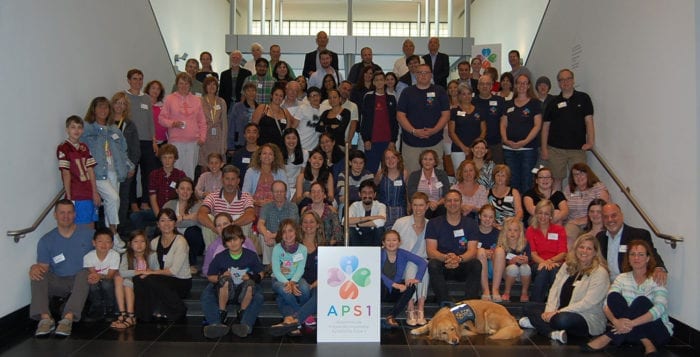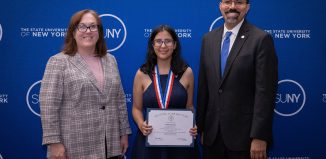Local family goes from organizing basket raffles to hosting international symposium

By Rita J. Egan
When their son Matthew, now 17, was diagnosed with Autoimmune Polyglandular Syndrome Type 1 11 years ago, Sherri and Dave Seyfert’s world was turned upside down.
The diagnosis led the Stony Brook couple to join the cause to find a cure for the rare autoimmune disease that affects 1 in 2 million people in the United States, and the results of their efforts culminated recently with the Second International Symposium on APS Type 1 at Stony Brook University July 13 through 15, an event they organized and hosted.
“Each time we have a hospitalization or emergency room visit or are in ICU, for the most part we learn something that will keep us out of there for that particular thing next time.”
—Dave Seyfert
The Seyferts with Todd and Heather Talarico of New Jersey founded the APS Type 1 Foundation with the main goal of making physicians more aware of the rare disorder. In the last decade, the families have raised $500,000 for research through fundraising events, which includes basket raffles organized by the Seyferts at the Setauket firehouse on Main Street.
The Seyferts said the basket raffles were always popular thanks to the support of local businesses and residents, and their fundraising success led to the hosting of the July symposium that gave researchers an opportunity to share information. It also provided patients and their loved ones a chance to find a much-needed support system.
Attendees traveled from all over the country as well as Ireland and South America to share their experiences. The couple said life after a diagnosis can sometimes be lonely for families.
“The symposium gave [families] the opportunity to share, to be able to provide each other with support and also listen to the researchers giving them hope that there’s a lot of research going on out there,” Sherri Seyfert said.
The Seyferts said “there are a lot of moving pieces” when it comes to APS Type 1, because the body has trouble metabolizing Vitamin D, which helps in the process of providing calcium to bones and muscles, including the heart.. A patient can experience various symptoms including cramping, bone mass problems and an irregular heart rhythm. However, a triad of disorders identifies the disease: adrenal insufficiency (Addison’s), hypoparathyroidism, and Candidiasis.

“So everybody is actually a little bit different as far as what conditions they have, even though they’ll share three things,” Dave Seyfert said.
He said the disease overall is manageable, even though patients can develop something new every decade of their life.
“Each time we have a hospitalization or emergency room visit or are in ICU, for the most part we learn something that will keep us out of there for that particular thing next time,” the father said.
He said the couple chose the university to recognize the contributions of Stony Brook Children’s Hospital to the community and their quick diagnosis of Matthew when he was six years old. At the time he was experiencing excessive fatigue and suffered a seizure in kindergarten. His father said it took 48 hours for the team at Stony Brook to diagnosis his son. It can sometimes take years to identify the disease in a patient.
The couple said the symposium included a section for children and teenagers to interact separately from adults. Matthew attended the event and assisted in escorting guests and served as a microphone runner during the Q&A.
Dr. Andrew Lane, professor of clinical pediatrics in the Division of Pediatric Endocrinology at Stony Brook Medicine, and Dr. Mark Anderson, director of University of California, San Francisco’s Medical Scientist Training Program, were among the speakers at the symposium.
“I think that [the Seyferts] are just a fantastic example of encouraging people to believe that for whatever medical condition or other condition in the world they are interested in fixing, even small things can make a difference.”
—Dr. Andrew Lane
“I thought it was really uplifting,” Lane said. “It was really great to see all the families supporting each other. It was also great for the physicians and scientists in the audience to interact, and informally and formally hear each other’s work and help recognize what areas need further work.”
Anderson, who met the Seyferts at the first symposium in Toronto, Canada in 2015, said there is hope for those diagnosed with APS Type 1. He said with stem cell transplants, the thymus, a gland that sits in front of the heart and plays a part in APS Type 1, may possibly be reprogrammed.
“That’s the type of thing that families want to know that someone is working on the problem,” Anderson said.
Lane, who was part of the team that diagnosed Matthew, said the symposium was the perfect opportunity for families to raise concerns directly to internationally recognized researchers in the field, and he is amazed that the family went from organizing basket raffles to hosting a symposium.
“I think that [the Seyferts] are just a fantastic example of encouraging people to believe that for whatever medical condition or other condition in the world they are interested in fixing, even small things can make a difference and sometimes turn into really big things,” Lane said.
Matthew was too shy to comment on the event, according to his mother, but she said the whole family was left with hope after the three-day symposium.
“People were thanking me, and my response always was it’s an honor to be able do this for everyone,” his mother said.
For more information about APS Type 1 and future events, visit www.apstype1.org.






